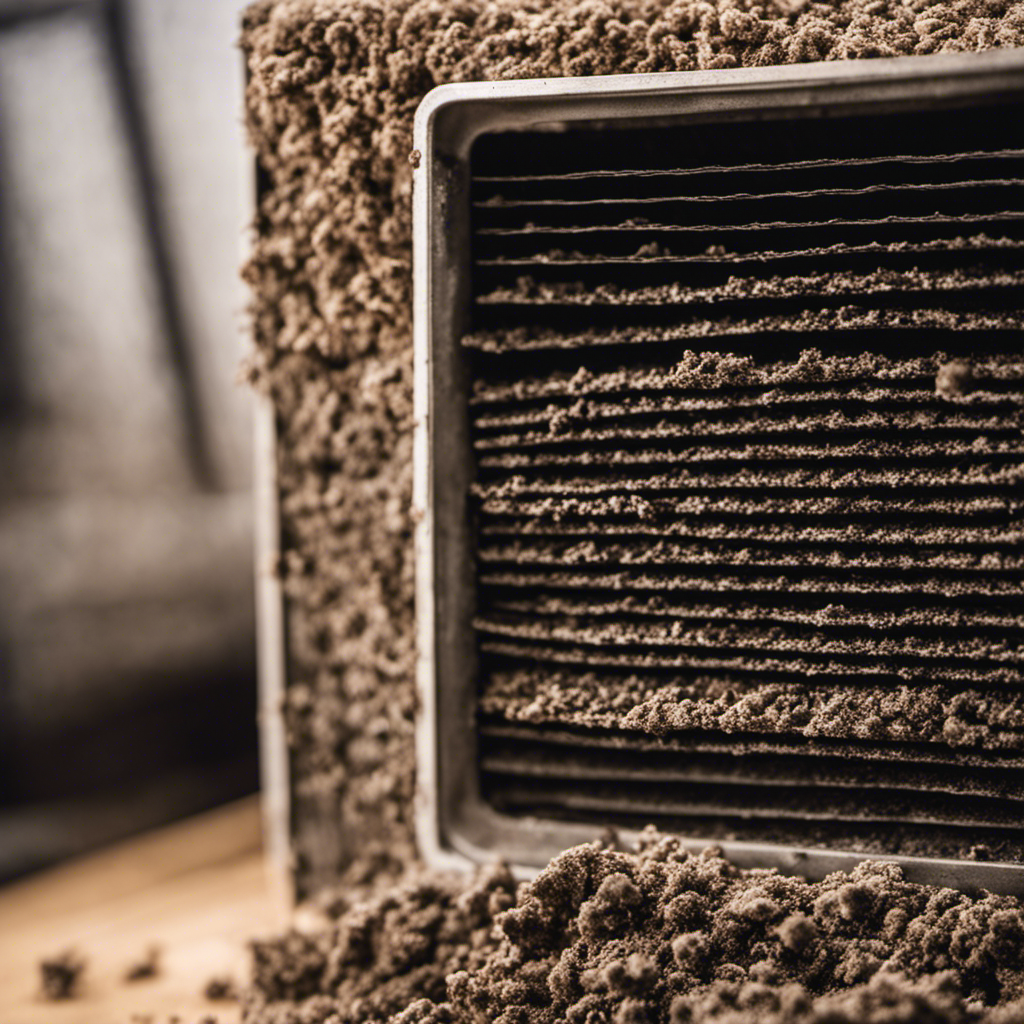In the world of home heating, the choice between running a furnace with a dirty filter or no filter at all can have significant consequences. This article examines the impact of a dirty filter on furnace efficiency, potential air quality issues without a filter, increased energy consumption, and the effects on the furnace’s lifespan.
By understanding the importance of maintaining a clean furnace filter, homeowners can strike a balance between energy efficiency and indoor air quality, ultimately serving their own needs and those of their loved ones.
Key Takeaways
- Running a furnace with a dirty filter or no filter can result in decreased efficiency and increased energy consumption.
- Without a filter, dust, pollen, and other allergens can circulate in the air, leading to potential health issues.
- A dirty filter can cause strain on the furnace components, leading to costly repairs and a shorter lifespan for the furnace.
- It is important to strike a balance between filtration efficiency and airflow when choosing and maintaining a furnace filter for optimal performance.
The Impact of a Dirty Filter on Furnace Efficiency
The presence of a dirty filter in a furnace can significantly impact its efficiency. Regular filter maintenance is of utmost importance to ensure the smooth operation of the furnace and avoid potential costly repairs.
A dirty filter restricts airflow, making the furnace work harder to distribute heated air throughout the space. This increased workload not only reduces the overall efficiency of the system but also puts unnecessary strain on its components. As a result, the furnace may consume more energy, leading to higher utility bills.
Moreover, a clogged filter can cause the furnace to overheat, potentially damaging the heat exchanger or other vital parts. By regularly cleaning or replacing the filter, homeowners can maintain optimal furnace efficiency and prevent the need for expensive repairs in the long run.
Potential Air Quality Issues Without a Furnace Filter
Without a furnace filter, the indoor air quality can be compromised and pose potential health risks to occupants. The absence of a filter allows dust, pollen, pet dander, and other airborne particles to freely circulate in the air. This can trigger allergies and respiratory problems in individuals, especially those who are sensitive to these particles.
Allergies can cause symptoms like sneezing, coughing, itching, and watery eyes, while respiratory problems may include difficulty breathing, wheezing, and asthma attacks.
Moreover, without a filter, harmful pollutants such as mold spores, bacteria, and viruses can also be circulated throughout the indoor environment, increasing the risk of infections and respiratory illnesses.
Therefore, it is essential to have a furnace filter in place to improve indoor air quality and safeguard the health of occupants.
Increased Energy Consumption With a Dirty Furnace Filter
A dirty furnace filter can lead to increased energy consumption and higher utility bills. When the filter becomes clogged with dust, dirt, and debris, it restricts the airflow, causing the furnace to work harder to maintain the desired temperature. This extra strain on the system results in increased energy usage, which in turn leads to higher monthly expenses.
Additionally, a dirty filter can also have a negative impact on indoor air quality. As the filter becomes saturated with pollutants, it becomes less effective in trapping dust and allergens, allowing them to circulate throughout the house. This can lead to respiratory issues and discomfort for those with allergies or asthma.
Regularly replacing or cleaning the furnace filter is essential to ensure optimal energy efficiency and maintain a healthy indoor environment.
The Effects of a Dirty Filter on Furnace Lifespan
Neglecting to clean or replace a dirty furnace filter can significantly shorten the lifespan of the furnace. A dirty filter can have detrimental effects on the heating performance of the furnace, leading to reduced efficiency and increased energy consumption.
When the filter is clogged with dust, debris, and other particles, it restricts the airflow, making it harder for the furnace to distribute heat effectively. As a result, the furnace has to work harder and longer to achieve the desired temperature, putting unnecessary strain on its components. This increased workload can lead to overheating and premature wear and tear, ultimately shortening the lifespan of the furnace.
Additionally, a dirty filter can also impact utility bills by causing the furnace to consume more energy in order to compensate for the restricted airflow and maintain the desired temperature. Regularly cleaning or replacing the furnace filter is essential to ensure optimal heating performance, extend the lifespan of the furnace, and keep utility bills under control.
Finding the Right Balance: Maintaining a Clean Furnace Filter
Ensuring a clean furnace filter is crucial for maintaining efficient heating performance and preventing potential damage to the furnace’s components.
However, there are common misconceptions about furnace filters that may lead homeowners to neglect their maintenance.
One misconception is that a dirty filter provides better filtration. In reality, a dirty filter restricts airflow, reducing the efficiency of the furnace and increasing energy consumption.
Another misconception is that all filters are the same. When choosing the right furnace filter for your home, it is important to consider the MERV (Minimum Efficiency Reporting Value) rating, which indicates the filter’s ability to capture particles of different sizes.
Higher-rated filters are more effective at capturing allergens and pollutants but may also restrict airflow. It is essential to find a balance between filtration efficiency and airflow to maintain optimal furnace performance.
Frequently Asked Questions
How Often Should I Change My Furnace Filter?
It is recommended to change your furnace filter every 1-3 months, depending on factors like air quality and usage. Regularly replacing the filter ensures efficient performance, improved indoor air quality, and reduced strain on the furnace system.
Can a Dirty Furnace Filter Cause Damage to My HVAC System?
A dirty furnace filter can potentially cause long-term damage to your HVAC system and impact energy efficiency. It is important to regularly change your filter to ensure optimal performance and prevent costly repairs.
What Are the Signs That Indicate a Dirty Furnace Filter Needs to Be Replaced?
Regular furnace filter maintenance is crucial for maintaining the efficiency and longevity of your HVAC system. Signs of a clogged furnace filter include reduced airflow, increased energy consumption, and decreased indoor air quality.
Are There Any Health Risks Associated With Running a Furnace Without a Filter?
Running a furnace without a filter can pose potential health risks as it allows dust, allergens, and other pollutants to circulate freely, reducing air quality. Regularly replacing and maintaining filters can provide health benefits by improving indoor air quality.
Can I Clean and Reuse a Dirty Furnace Filter Instead of Replacing It?
Cleaning furnace filters is a recommended maintenance practice to ensure optimal performance and efficiency. Clean filters provide benefits such as improved air quality, reduced energy consumption, and extended lifespan of the furnace system.


